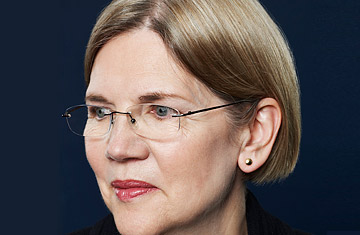
Warren is hoping to run the watchdog bureau she helped create
(2 of 3)
Too Candid for Washington?
"There is nothing about what this agency is doing that should be controversial," Warren says. During a 45-minute interview, conducted on the condition that only policy substance would be discussed, Warren explains that her only true enemy is the fine print on banking terms, loan applications and credit-card offers. "There are two things people ought to be able to ask" about financial products, she says. "Can I afford this thing? And is this the best deal I can get?" Warren says the new consumer bureau will make both of those questions easier to answer by requiring loan companies to explain their terms and conditions in shorter and simpler ways, perhaps reducing mortgage documents to standardized two-page forms. "Right now people drown in a sea of words that are theoretically disclosures, but they scream, 'Don't read me.' This is truly a world in which less is more," she explains.
It's a typically snappy assessment from a woman who, through platforms that include public speaking, blogging and Daily Show appearances (Jon Stewart once joked that he wanted to "make out" with her), has become a celebrity for the Rachel Maddow–watching set. Nor does it hurt that the 62-year-old Warren, who teaches contract law at Harvard, is a former Sunday-school teacher who still has a trace of native Oklahoma twang in her voice, giving her an everywoman quality that belies her elite Ivy League perch. Nader has said Warren "combines rigorous scholarship, a superb sense of needed change and clear ways to communicate those needs to families and individuals around the country."
Those attributes, plus her presence at the bureau's creation (last September, Obama named Warren as a special Treasury Department adviser charged with helping get the bureau organized and launched), make her the natural and even necessary first choice to run it, Democrats say. "She's obviously uniquely well qualified," says Democratic Representative Carolyn Maloney of New York, one of Warren's boosters.
But plenty of CEOs find Warren grating and complain that she has unfairly demonized financial firms. The Wall Street Journal's editorial page has branded her "Elizabeth III." Even her allies acknowledge that she can be a loose cannon, and she has openly accused big financial institutions of "tricking and trapping" consumers. ("I can't keep my mouth shut," Warren admitted to one interviewer last year.)
Perhaps fearful of being labeled sexists, Warren's opponents are careful not to personalize the dispute — and even offer flattering words for their nemesis. "She's smart and charming," says David Hirschmann of the U.S. Chamber of Commerce, which has fought tenaciously against the consumer bureau. The problem, argue Hirschmann and Republicans in Congress, is the office itself. The bureau will have a staff of several hundred, empowered to snoop around the books of big financial institutions like Wall Street banks. Critics say the office will have too much power and not enough oversight. The bureau's legal mandate to protect consumers from "unfair, deceptive or abusive acts and practices and from discrimination" is dangerously broad, they say, and is a recipe for overburdening businesses. (The bureau is still establishing the exact scope of its authority but wants jurisdiction over consumer-finance companies like debt collectors and makers of prepaid debit cards.) Those critics also fret that the law makes the watchdog's decisions too hard to overrule, requiring a two-thirds vote from the 10-member Financial Stability Oversight Council. Democrats say no other regulator faces such an override.
In return for considering any potential nominees, then, Republican Senators are insisting that Obama agree to have the office run by a five-person board rather than one individual. They also want to change the fact that its budget will come directly from the Federal Reserve, where the bureau will be housed, giving Congress no purse-string power. Without budget oversight, "there's no accountability," says House Financial Services Committee chairman Spencer Bachus.
Democrats protest that a consumer advocate should have clear independence from the pressures of corporate lobbyists in Congress and that turning the bureau over to a five-member board would produce slow and diluted decisionmaking. Besides, Democratic Senator Tim Johnson recently noted, Republicans already had a chance to shape the original bill last year. "We should not relegislate the bureau when it hasn't even had a chance to start doing its job," Johnson said in May.
